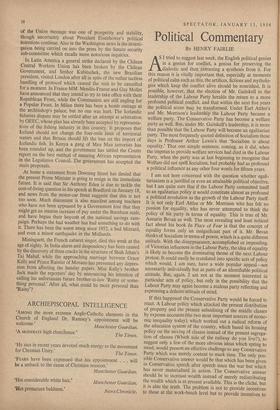Political Commentary BY HENRY FAIRLIE A , I tried to suggest
last week, the English political genius is a genius for conflict, a genius for preserving the dialectic and then extracting a synthesis from it. For this reason it is vitally important that, especially at moments of political calm such as this, the artifices, fictions and mytholo- gies which keep the conflict alive should be nourished. It is possible, however, that the election of Mr. Gaitskell to the leadership of the Labour Party heralds the return to a more profound political conflict, and that within the next five years the political scene may be transformed. Under Earl Attlee's and Mr. Morrison's leadership the Labour Party became a welfare party. The Conservative Party has become a welfare party as well. But, under Mr. Gaitskell's leadership, it is more than possible that the Labour Party will become an egalitarian party. The most frequently quoted definition of Socialism these days is Professor Arthur Lewis's that 'Socialism is about equality.' That one simple sentence, coming, as it did, when the impetus to provide welfare services had died in the Labour Party, when the party was at last beginning to recognise that Welfare did not spell Socialism, had probably had as profound a political influence as any other four words for fifteen years.
I am not here concerned with the question whether egali- tarianism is a justified or even an attainable political objective, but I am quite sure that if the Labour Party committed itself to an egalitarian policy it would constitute almost as profound a political revolution as the growth of the Labour Party itself. It is not only Earl Attlee or Mr. Morrison who has felt no passion for equality, who has never attempted to think the policy of his party in terms of equality. This is true of Mr. Aneurin Bevan as well. The most revealing and least noticed fact about his book In Place of Fear is that the concept of equality forms only an insignificant part of it. Mr. Bevan thinks of Socialism in terms of power, which is a quite different attitude. With the disappearance, accomplished or impending, of Victorian influences in the Labour Party, the idea of equality is likely to become the dominating theme of the next Labour protest. It could easily be translated into specific acts of policy which would, I am sure, have a wide popular appeal—not necessarily individually but as parts of an identifiable political attitude. But, again, I am not at the moment interested in particular acts of policy, but only in the possibility that the Labour Party may again become a zealous party reflecting and expressing a definite.attitude of mind.
If this happened the Conservative Party would be forced to react. A Labour policy which attacked the present distribution of property and the present subsidising of the middle classes by expense accounts (the two most important sources of econo- , mip inequality today), which worked out a radical reform of the education system of the country, which based its housing policy on the mixing of classes instead of the present segrega- tion of classes (Which side of the railway do you live?), to suggest only a few of the more obvious ideas which spring to mind, would present an effective challenge to any Conservative Party which was merely content to mark time. The only pos- sible Conservative answer would be that which has been given in Conservative speech after speech since the war but which has never materialised in action. The Conservative answer should be to increase wealth instead of merely redistributing the wealth which is at present available. This is the cliché, but it is also the truth. The problem is not to provide incentives to those at the work-bench level but to provide incentives to those who in fact determine the manner in which those at the bench do their work. The only two incentives for the owners and managers of industry are the hope of power or profit.
A Conservative Government which was prepared, at this stage of the present Government's life, to take the necessary risks and make a drastic cut in Government expenditure, followed by a drastic cut in taxation, would have some hope of pulling the country through. The objection, of course. is that no drastic cut in expenditure is possible without a drastic cut in the social services, and that no Conservative Government would survive such a step. This, I believe, is nonsense. It is no part of Conservative policy that social services should be extended willy-nilly to the entire population. The Conservative aim is to provide a floor below which no family shall fall. The present general social services go much further than that, with consequent injustices such as that some of the money which should rightly go to old-age pensioners goes to young and prosperous families, living in subsidised house and owning cars and television sets. There is no reason at all why a complete abandonment of the present system of social services should cause any hardship; there is every reason why it should lessen the hardship now suffered by the really deserving. The chances of a Conservative Government carrying out any such policy • are slight, so bemused are its leaders by the myth of the `uncommitted centre' voter. But if 'the Government lets slip its chances it may as well resign itself to the fact that it will be succeeded not only by a Labour Government but by the first Labour. Government committed to an egalitarian policy.



































 Previous page
Previous page